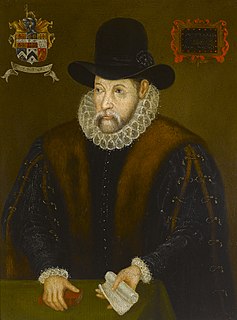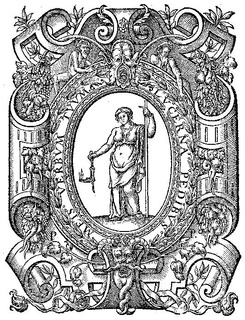Life
Born in Monmouthshire, Phillips entered the University of Oxford in 1533, graduating B.A. on 18 February 1538; he was elected a fellow of Oriel College on 17 April 1538. He commenced M.A. on 27 March 1542, was afterwards ordained priest, and later proceeded B.D. [1]
In 1543 Phillips was presented to the rectory of Kiddington, Oxfordshire, and on 5 February 1546 was appointed principal of St Mary Hall, Oxford. He was one of the three prominent Catholics who, in 1549, took part in a public disputation against Pietro Martire Vermigli in the divinity hall of the university, with William Tresham and William Chedsey. In the same year he obtained the vicarage of St Winnoc, Pembrokeshire. [1] [3]
In 1550 Phillips resigned the post of principal of St Mary Hall, and soon after the accession of Queen Mary, in 1553, he became precentor of St David's Cathedral. After his absence from Oriel College for a longer time than was allowed, his fellowship was declared vacant on 20 December 1554. [2]
Declining to accept the religious changes of the reign of Elizabeth I, Phillips left for the continent and settled at Leuven. Soon afterwards he visited Rome with William Allen and Jean Vendeville. On his return to Flanders he worked with Allen to establish an English seminary college at Douai; and he advanced the first sum of money for it. [2] Owen Lewis, then at the University of Douai, joined them in a close group of friends. [1]
Phillips died at Douai College on 18 August 1570. By his will he left to Allen all his property, which was used to enlarge the college. Under his name as author was republished in 1571 the Treatise of John Lesley on Mary, Queen of Scots. [2]

Peter Martyr Vermigli was an Italian-born Calvinist theologian. His early work as a reformer in Catholic Italy and his decision to flee for Protestant northern Europe influenced many other Italians to convert and flee as well. In England, he influenced the Edwardian Reformation, including the Eucharistic service of the 1552 Book of Common Prayer. He was considered an authority on the Eucharist among the Calvinist churches, and engaged in controversies on the subject by writing treatises. Vermigli's Loci Communes, a compilation of excerpts from his biblical commentaries organised by the topics of systematic theology, became a standard Calvinist theological textbook.

William Allen, also known as Guilielmus Alanus or Gulielmus Alanus, was an English Cardinal of the Roman Catholic Church. He was an ordained priest, but was never a bishop. His main role was setting up colleges to train English missionary priests with the mission of returning secretly to England to keep Roman Catholicism alive there. Allen assisted in the planning of the Spanish Armada's attempted invasion of England in 1588. It failed badly, but if it had succeeded he would probably have been made Archbishop of Canterbury and Lord Chancellor. The Douai-Rheims Bible, a complete translation into English from the Latin, was printed under Allen's orders. His activities were part of the Counter Reformation, but they led to an intense response in England and in Ireland. He advised and recommended Pope Pius V to pronounce Elizabeth I deposed. After the Pope declared her excommunicated and deposed, Elizabeth intensified the persecution of her Roman Catholic religious opponents.

John Roy Hooper was an English churchman, Anglican Bishop of Gloucester, later of Worcester and Gloucester, a Protestant reformer and a Protestant martyr. A proponent of the English Reformation, he was executed for heresy by burning during the reign of Queen Mary I.

John HookeraliasJohn Vowell of Exeter in Devon, was an English historian, writer, solicitor, antiquary, and civic administrator. From 1555 to his death he was Chamberlain of Exeter. He was twice MP for Exeter in 1570/1 and 1586, and for Athenry in Ireland in 1569 and wrote an influential treatise on parliamentary procedure. He wrote an eye-witness account of the siege of Exeter during the Prayer Book Rebellion in 1549. He spent several years in Ireland as legal adviser to Sir Peter Carew, and following Carew's death in 1575 wrote his biography. He was one of the editors of the second edition of Raphael Holinshed's Chronicles, published in 1587. His last, unpublished and probably uncompleted work was the first topographical description of the county of Devon. He founded a guild of Merchant Adventurers under a charter from Queen Mary. He was the uncle of Richard Hooker, the influential Anglican theologian.

Hans Asper was a Swiss painter best known for his portraits.

St Mary Hall was a medieval academic hall of the University of Oxford. It was associated with Oriel College from 1326 to 1545, but functioned independently from 1545 until it was incorporated into Oriel College in 1902.

Lawrence Humphrey DD was an English theologian, who was President of Magdalen College, Oxford, and Dean successively of Gloucester and Winchester.
Thomas Young was a Bishop of St David's and Archbishop of York (1561–1568).
Thomas Worthington, D.D. was an English Catholic priest and third President of Douai College.

Richard Smyth was the first person to hold the office of Regius Professor of Divinity in the University of Oxford and the first Chancellor of the University of Douai.

Pietro Perna was an Italian printer, the leading printer of Late Renaissance Basel, the Erasmian crossroads between Italian Renaissance humanism and the Protestant Reformation. His books promoted the Italian heretical thinkers at the origins of Socinianism and the theory of Tolerance. He was a major publisher of Protestant historians like Flacius Illyricus and David Chytraeus and promoted the ars historica treatises of the period, notably the 18 authores de historia in Artis Historicae Penus (1579).

The Reverend Father Gregory Martin was an English Catholic Priest, a noted scholar of his time, academic and Doctor of Divinity, and served as the chief translator of the Rheims and Douai Version of the Bible, the first full, official Catholic English Bible translation, translated from the Latin Vulgate.
John Martiall (Marshall) was an English Roman Catholic priest. He was one of the six companions associated with William Allen in the foundation of the English College at Douai, in 1568.
Walter Haddon LL.D. (1515–1572) was an English civil lawyer, much involved in church and university affairs under Edward VI, Queen Mary, and Elizabeth I. He was a University of Cambridge humanist and reformer, and was highly reputed in his time as a Latinist. He sat as an MP during the reigns of Mary and Elizabeth. His controversial exchange with the Portuguese historian Jerónimo Osório attracted international attention partly on account of the scholarly reputations of the protagonists.
Richard Marshall D.D. was an English clergyman and academic administrator at the University of Oxford.

David Whitehead (1492?–1571) was an English evangelical priest, a Marian exile and author.
Gerbrand Harkes was a Dutch Protestant who became a bookseller and dealer in manuscripts in England.
Alban Langdale or Langdaile was an English Roman Catholic churchman and author.
John Seton D.D. was an English Roman Catholic priest, known as the author of a standard logic text.
Catherine Dammartin was a nun in Metz who left her convent, adopted evangelical views, and married Peter Martyr Vermigli. She is buried with Frideswide, the patron saint of Oxford.
![]() This article incorporates text from a publication now in the public domain : Lee, Sidney, ed. (1896). "Philipps, Morgan". Dictionary of National Biography . Vol. 45. London: Smith, Elder & Co.
This article incorporates text from a publication now in the public domain : Lee, Sidney, ed. (1896). "Philipps, Morgan". Dictionary of National Biography . Vol. 45. London: Smith, Elder & Co.









